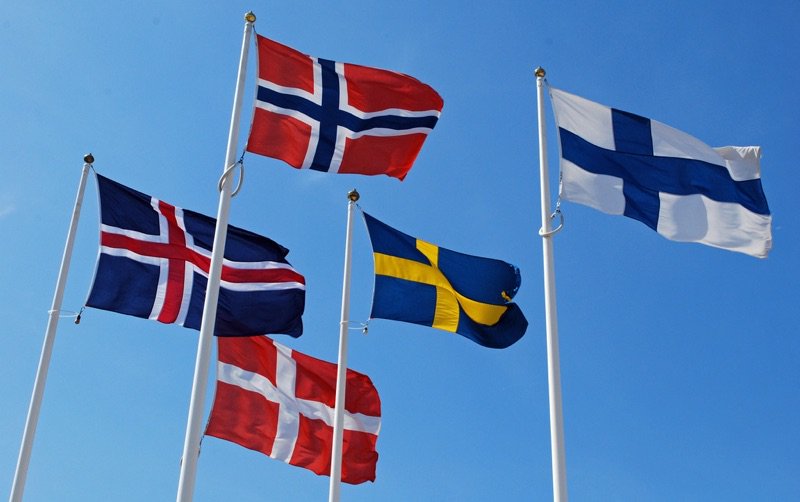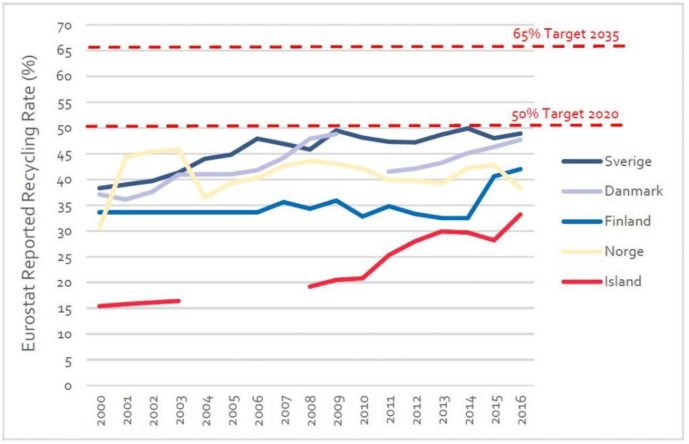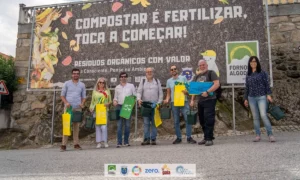Incineration is getting in the way of recycling and zero waste

Did you hear about incineration being popular in Nordic countries? Do not believe the hype! A recent study from Eunomia, commissioned by the Nordic Council of Ministers, highlights that the Nordic nations – Denmark, Finland, Iceland, Norway and Sweden – are not on track to meet the recycling targets of the EU revised Waste Directive, because of their overreliance on incineration.
There is a capacity or planned capacity for incineration which is not in alignment with the EU’s revised recycling targets.
Report: “Analysis of Nordic regulatory framework and its effect on waste prevention and recycling in the region” (Eunomia, 2019)
Despite the common opinion that Nordic countries have some of the most developed and mature waste management systems in Europe, Zero Waste Europe has highlighted several times the problems of incineration capacities in the region (learn more about the cases of Denmark and Sweden) which appear to be, once again, one of the main obstacles towards the achievement of the recycling targets.
Indeed, the report identifies a mismatch between the current waste infrastructure and the infrastructure required to meet the recycling aspirations outlined in the European directive, as most of the Nordic countries are currently between 16 to 32 percentage points below the 2035 target, with Finland, Iceland and Norway well off track from meeting even their 2020 target of a 50% recycling rate.
Eurostat Reported Recycling Rate of Municipal Waste for Nordic Countries (Eunomia, 2019)
Therefore, the report calls for fundamental change to put recycling at the core of national waste policies, making it either the cheapest option on the market or absolutely mandatory.
Clearly, different Nordic nations are at different points in terms of the changes necessary to their waste management systems. However, the report summed up a set of recommendations relevant for all Nordic countries – at least to a significant degree – to develop their waste management systems and achieve higher recycling rates in line with a circular economy, including:
- Increase of separate door-to-door collection system especially for recyclables and bio-waste
- Maximize separate collection and improve sorting capacity for mixed waste
- Increase taxes or instate bans on recyclable materials who are now incinerated
- Implement a Deposit Return System (DRS) for metal containers and reform of Extended Producer Responsibility (EPR)
- Possibly, introduce Pay-As-You-Throw (PAYT) systems to encourage people not to discard recyclable materials in waste intended for incineration
- Invest in new or more efficient recycling and composting infrastructure.
However, the most important area that requires a significant change will be a shift away from incineration towards recycling.
The role of waste incineration – currently, the predominant waste-to-energy option – needs to be redefined to ensure that increases in recycling and reuse are not hampered and that overcapacities for residual waste treatment are averted…
Report: “Analysis of Nordic regulatory framework and its effect on waste prevention and recycling in the region” (Eunomia, 2019)
In the short term, there is an opportunity for collaboration across the Nordic region by identifying examples of best practices for those countries performing less well to benefit from the experience of other countries across the group. Moreover, Zero Waste Europe also suggests the chance to learn from zero waste best practices developed across cities in Europe (discover them on Zero Waste Cities website).
While, at the EU level, Institutions should ensure to phase out funding for incineration practices, and instead promote the transition to a greener Europe while focusing on improving waste prevention, on building more efficient infrastructures, on increasing recycling capacity and on diverting bio-waste from landfills.
Download the report here.


